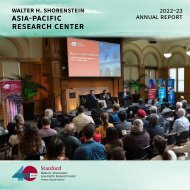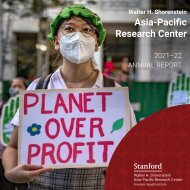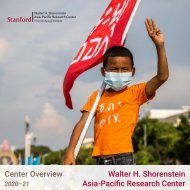Shorenstein Asia-Pacific Research Center 2018-19 Annual Report
The Walter H. Shorenstein Asia-Pacific Research Center (Shorenstein APARC) addresses critical issues affecting the countries of Asia, their regional and global affairs, and U.S.-Asia relations. As Stanford University’s hub for the interdisciplinary study of contemporary Asia, we produce policy-relevant research, provide education and training to students, scholars, and practitioners, and strengthen dialogue and cooperation between counterparts in the Asia-Pacific and the United States. This is our annual overview for the academic year 2018-19.
The Walter H. Shorenstein Asia-Pacific Research Center (Shorenstein APARC) addresses critical issues affecting the countries of Asia, their regional and global affairs, and U.S.-Asia relations. As Stanford University’s hub for the interdisciplinary study of contemporary Asia, we produce policy-relevant research, provide education and training to students, scholars, and practitioners, and strengthen dialogue and cooperation between counterparts in the Asia-Pacific and the United States. This is our annual overview for the academic year 2018-19.
Create successful ePaper yourself
Turn your PDF publications into a flip-book with our unique Google optimized e-Paper software.
EDUCATION
“We decided it would be useful to gather those doing various types of
research, quantitative and qualitative, to think about what we don’t know
of Chinese politics but would like to know and how we might possibly
go about conducting that research to contribute to the broader field of
comparative politics.” Jean Oi
Advancing the Fields of Chinese Politics and Korean Studies in
the 21st Century
Two major conferences held in fall quarter 2018
shone light on Shorenstein APARC’s commitment
to promoting undergraduate- and graduate-level
interdisciplinary study of the politics, economies, and
societies of contemporary Asia.
In November, the Korea
Program’s two-day conference
“Future Visions” drew distinguished
Korean studies scholars
from twelve North American
institutions to consider the state
of the field, assess its challenges,
and carry forward a vision for
its future direction and potential. Cosponsored by the
Seoul-based Foundation Academia Platonica, the
conference featured six unique panels, focusing not only
on the major disciplines of Korean Studies — history,
literature, and the social sciences — but also on language
education, library collections and services, and the
Korean Wave, featuring a closing session with K-pop
star Siwon Choi of the Korean boy band Super Junior.
READ MORE // stanford.io/2DhJGG2
In the following month, the China Program gathered
preeminent scholars of Chinese politics and comparative
politics, primarily from North American institutions,
to examine the state of the discipline, Xi Jinping’s impact
on Chinese politics and its concomitant influence on
what and how scholars study Chinese politics, and where
the field might go next. The two-day conference included
presentations by seven working groups, a plenary session,
breakout discussions, and responses by Stanford scholars
of comparative politics to the group memos.
READ MORE // stanford.io/2mlyRw9
ABOVE (l–r) Professors Kellee Tsai, Jean Oi, Mary Gallagher,
and Margaret Pearson confer at the China Program’s conference
on Chinese politics. INSET The “Future Visions” conference’s Korean
Wave session featured K-pop star Siwon Choi of Super Junior.
SHORENSTEIN APARC 15






